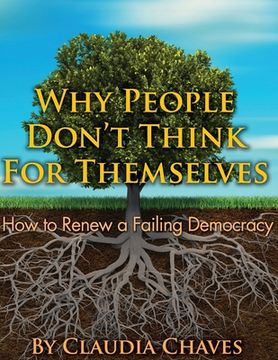Why People Don't Think For Themselves: How To Renew A Failing Democracy (en Inglés)
Reseña del libro "Why People Don't Think For Themselves: How To Renew A Failing Democracy (en Inglés)"
Why are voters so easily hoodwinked? Why so many vote against their own interests? What is it about human beings that corrupts even the systems and organizations designed with the best of intentions? Why don't people or nations learn from experience, or from history? When is truth really relative, and when saying that is an excuse? What goes on inside people when they describe such different "realities" at the least whiff of a conflict of interests? Does thinking for yourself make you happier, unhappier, or are there different kinds of happiness? Why did the US democracy turn into a plutocracy, again? Many people ask these questions with mounting frustration, having to bear the compounding absurdities in relationships and systems, big and small. To really understand these issues we have to look at them from several viewpoints, because the real answer is multifaceted. When we analyze political behavior - or more broadly, when we want to understand what underpins and mediates the decisions we make -- much is lost if we do so only from the perspective of one discipline. Political behavior and political psychology can be analyzed from the perspective of history, anthropology, political science, economics, or psychology: cognitive, social, cultural, existential, or evolutionary psychology. Each perspective provides meaningful understandings. Here I create a framework combining multiple perspectives, and invite other thinkers and researchers to add and elaborate on each as well as on the whole. In the last three decades, excellent books and articles have been published about the human mind and more recently, about the brain. There is fascinating research about many issues mentioned here, studying specific phenomena within specific disciplines. There is both the need for specialization, as well as for creating comprehensive pictures, gestalts, to help us see how the parts fit together and interact. My contribution here is to present some new pieces of this puzzle, and together with the pieces described by others, fit them into a composite picture that hopefully enhances the meaning of the parts. I believe you will also find that some familiar concepts are presented in a new light. This is a book about what is necessary to make democracy real as well as sane, and create a benevolent society and culture for all its members. It is about how and why democratic institutions get hijacked by demagogues - heads of corporations, political manipulators and actual politicians with the active support of the media, often the academia, and the collusion of citizens who don't know how to think for themselves, nor wish to. Therefore, I will examine the "organ" where true sovereignty is supposed to reside: people's consciousness -- minds and hearts. At the same time, this book is about deep happiness, about healthier relationships and workplaces, and about living fuller lives. Those who manipulate people's consciousness already understand how people deceive themselves (intuitively at least) because knowing this is a set of social intuitions which are part of our evolutionary psychology. So it befits the rest of us to also understand this if we are to free ourselves from their manipulations. A commitment to continuously knowing ourselves better is essential to this freedom from the demagoguery/plutocracy/oligarchy that is a constant threat to actual government by the people, for the people. It also brings inner peace. So while I explain why most people are conformists, shuffling prefabricated ideas and assumptions rather than producing original and practical thinking; and I decry the culture of spin and all manner of manipulative methods -- I point to what is needed to develop a special sensitivity in the mind and the freedom to think for oneself. The book pivots on the things people care about most, yet often ignore or betray: things like truth, integrity, meaning in life, and most of all deep happiness.

